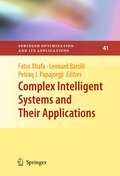
Complex intelligent systems and their applications
Xhafa, Fatos
Barolli, Leonard
Papajorgji, Petraq J.
Complex Intelligent Systems and Applications' presents the most up-to-date advances in complex, software intensive and intelligent systems. Each self-contained chapter is the contribution of distinguished experts in areas of researchrelevant to the study of complex, intelligent, and software intensive systems. These contributions focus on the resolution of complex problems from areas of networking, optimization and artificial intelligence. The book is divided into three parts focusing on complex intelligent network systems, efficient resource management in complex systems, and artificial data mining systems. Through the presentation of these diverse areas of application, the volume provides insights into the multidisciplinary nature of complex problems. Throughout theentire book, special emphasis is placed on optimization and efficiency in resource management, network interaction, and intelligent system design. This book presents the most recent interdisciplinary results in this area of research and can serve as a valuable tool for researchers interested in defining and resolving the types of complex problems that arise in networking, optimization, and artificial intelligence. Considers the multi-disciplinary nature of complex problems in intelligent systems and a range of state-of-the-art techniques used to resolve these problems Graduate students as well as researchers will find this a useful guide to the most up-to-date techniques available to resolve complex problems in networking, optimization, and artificial intelligence Reallife examples presented throughout the book extend the text’s suitability to practitioners INDICE: Preface.- Acknowledgments.- 1. Thomas Moser, Richard Mordinyi Alexander Mikula Stefan Biffl. Efficient Integration of Complex Information Systems in the ATM Domain with Explicit Expert Knowledge Models.- 2. Csaba Veres, Jennifer Sampson, Karl Cox, Steven Bleistein, and June Verner: An Ontology BasedApproach for Supporting Business-IT Alignment.- 3. Christoph Goebel, Sergei Evdokimov, Christoph Tribowski, Oliver Gunther: EPCIS-based Supply Chain Event Management.- 4. Omar Hussain and Tharam Dillon: Cost-Benefit Analysis to Hedgewith Third Party Producers in Demand-Driven Production.- 5. Igli Tashi and Solange Ghernaouti- Hélie: A Security Assurance Model to holistically assess theInformation Security Posture.- 6. Stefan Jakoubi, Simon Tjoa, Sigrun Goluch and Gerhard Kitzler: Risk-Aware Business Process Management - Establishing the Link Between Business and Security.- 7. Evangelos Pournaras, Martijn Warnier and Frances M.T. Brazier: Self-optimised Tree Overlays using Proximity-driven Self-organised Agents.- 8. Shinya Kitajima, Takahiro Hara, Tsutomu Terada and Shojiro Nishio: Filtering Order Adaptation Based on Attractor Selection for Data Broadcasting System.- 9. Marcin Gorawski and Aleksander Chrószcz: StreamStreamAPAS: Query Language and Data ModelAPAS: Query Language and Data Model.- 10.Sabri Pllana, Siegfried Benkner, Eduard Mehofer, Lasse Natvig and Fatos Xhafa: Agent-supported Programming of Multi-core Computing Systems.- 11. Antonio Gentile and Salvatore Vitabile: Multimodal And Agent-Based Human-Computer Interaction In Cultural Heritage Applications: An Overview.- 12. Andrei Doncescu, Sebastien Regis and Nabil Kabaj: Reinforced operators in fuzzy clustering systems.
- ISBN: 978-1-4419-1635-8
- Editorial: Springer
- Encuadernacion: Cartoné
- Páginas: 267
- Fecha Publicación: 17/06/2010
- Nº Volúmenes: 1
- Idioma: Inglés
